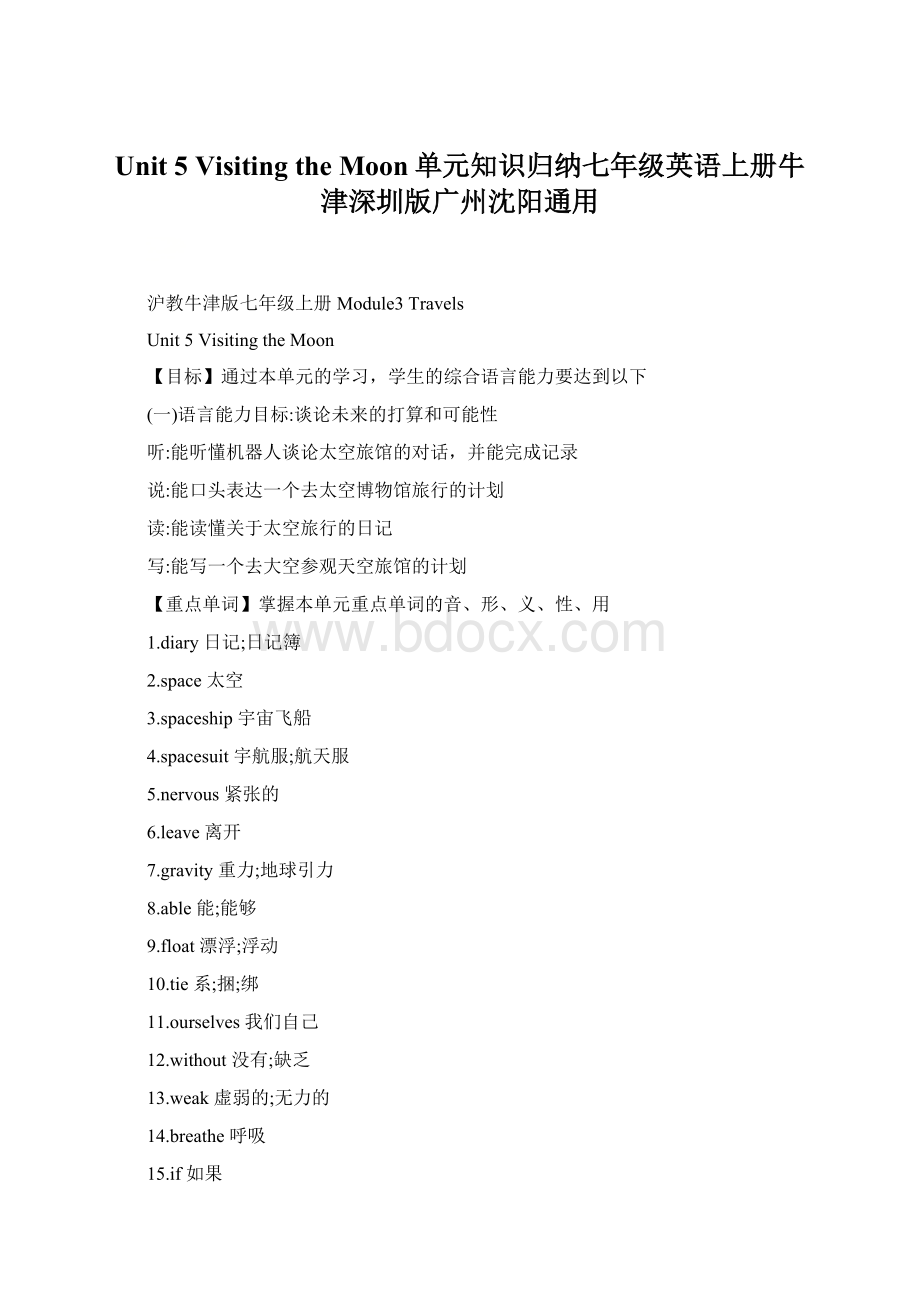Unit 5 Visiting the Moon单元知识归纳七年级英语上册牛津深圳版广州沈阳通用Word格式.docx
《Unit 5 Visiting the Moon单元知识归纳七年级英语上册牛津深圳版广州沈阳通用Word格式.docx》由会员分享,可在线阅读,更多相关《Unit 5 Visiting the Moon单元知识归纳七年级英语上册牛津深圳版广州沈阳通用Word格式.docx(12页珍藏版)》请在冰豆网上搜索。

13.weak虚弱的;
无力的
14.breathe呼吸
15.if如果
16.camera照相机
17.work运转;
运行
18.garden花园
19.rock岩石
20.postcard明信片
21.machine机器
22.return返回
23.morethan多于
24.(be)ableto能够
25.haveto不得不;
必须
26.sothat以便
27.takephotos拍照
28.as...as像…一样;
如同
29.thatis也就是说;
30.suchas例如
【重点短语】掌握本单元重点短语并能熟练造句
1.morethan超过
2.(be)ableto能够
3.haveto不得不
4.sothat以便
5.takephotos拍照
6.as....as和...一样
7.thatis也就是说
8.suchas例如
9.howfar多远
10.take...to...把....带到....
11.everyday每天
12.toomany太多
13.writedown写下,记下
14.from...to...从...到...
15.inthefuture在将来
16.alargeamountof大量的
17.takeatrip旅行
18.thousandsof数千
【经典句型】
1.Howfarcanyouseeonaclearnightnight?
2.Therecanbemorethanoneanswer.
3.TomorrowI'
llbeoneofthefirststudentstotravelintospace.
4.TheMoonisaround380,000kilometresfromtheEarth,soit'
lltakeusaboutfourdaystogetthere.
5.There’snogravityinspace,sowe’llallbeabletofloataroundinthespaceship.
6.We’llhavetotieourselvestoourbedssothatwewontfloatawayinoursleep
7.Ifwecansolvesomeproblems,wewillbeabletobuildhotelsthereinthefuture.
8.TherewillbehotelsontheMooninthefuture.
【核心语法】
熟练掌握本单元核心语法
一般将来时(will;
begoingto)
Period1Gettingready&
Reading
知识点一howfar的用法
Howfarcanyouseeonaclearnight?
在一个晴朗的夜晚你能看多远?
howfar意为“多远”,引导特殊疑句用来提问距离。
常用It’s...meter(s)/kilometer(s)(from...to..)回答。
It指代两地间的距离,from和to后接地点名词。
—Howfarisitfromyourhometotheschool?
从你家到学校有多远?
—It’sabout3kilometers.大约3千米。
练习:
—_________isitfromyourschooltothebusstop?
—it'
sabout5minutes'
walk.
A.HowoftenB.HowlongC.HowsoonD.Howfar
知识点二morethan的用法
Therecanbemorethanoneanswer.可以有不止一个答案。
morethan意为“多于;
超过”,其同义词为over,反义短语为lessthan“少于;
不到”。
Hehasmorethan/overfiftybooks.他有50多本书.
拓展:
morethan相关短语
(1)nomorethan(=only)仅仅,只不过
(2)not/nomorethan至多,不超过
(3)more..than比…更
(4)不止一个....
morethanone+单数名词,作主语时,谓语动词用单数形式
more+复数名词+thanone,作主语时,谓语动词用复数形式
—Shewasthebest-sellerinthecompanyandherbossgaveheraspecialten-dayholiday.
—That'
ssocool.Shesoldout_________productsthananyotherslastyear.
A.themostB.moreC.fewer
知识点三ourselves的用法
We’llhavetotieourselvestoourbedssothatwewontfloatawayinoursleep!
我们将不得不把我们自己系在床上,以便我们睡着时不会飘走!
ourselves作反身代词,意为“我们自己”,由“形容词性物主代词our+-selves构成。
Wemustlookafterourselves我们必须照顾我们自己。
反身代词
(1)构成
第一、二人称反身代词:
形容词性物主代词+self/selves
第三人称反身代词:
宾格代词+self/selves
单数:
词尾是-self
复数:
词尾是selves
(2)用法:
作同位语或宾语
A.反身代词单复数形式应和句子主语保持一致
B.句中主语和宾语指同一人时,宾语应用反身代词
(3)常用短语
enjoyoneself玩得高兴
teachoneself自学
byoneself独自;
单独
练习:
MarsBase1CampwasbuiltinJinchang,Gansu,toletyoungpeopleexperiencefor________.
A.itB.themC.itselfD.themselves
知识点四sothat的用法
We’llhavetotieourselvestoourbedssothatwewon’tfloatawayinoursleep!
我们将不得不把我们自已系在床上,以便我们睡着时不会飘走
sothat意为“以便”,引导目的状语从句,从句中常用cancould、may、might等情态动词。
IgetupearlysothatIcancatchthefirstbus.我早起以便能赶上首班车。
温馨提示
sothat可与inorderthat从句”inordertodosth.或动词不定式结构进行同义句转换。
sothat也可表示“因此;
所以”,引导结果状语从句,此时从句中没有情态动词。
Tomstudieshard,sothathegetsgoodgrades.
汤姆学习努力,因此他取得了好成绩。
—Whatamess!
Thesharingbikesarethrowneverywhere.
—Let'
scollectandputthemintherightplace_______theycanbeusedconveniently.
A.unlessB.sothatC.becauseD.solongas
重点难点全解精讲
知识点一It’lltakesb.sometimetodosth.句型
TheMoonisaround380.000kilometresfromtheEarth,soit’lltakeusaboutfourdaystogetthere.月球离地球约380,000千米,因此到达那里将花费我们大约
四天的时间。
句型“It’lltakesb.sometimetodosth.意为”做某事将花费某人多少时间”。
其一般现在时结构为“Ittakesessb.sometimetodosth.”。
该句型中是形式主语,真正的主语是动词不定式。
Itwilltakemethreehourstofinishthework.完成这项工作将要花费我三个小时。
Ittakessbsometimetodosth.”可与“Sb.spend(s)sometime(in)doingsth.进行同义
句转换。
RoyworksinLondon.It________himabouthalfanhourtogettoworkbybuseveryday.
A.costsB.spendsC.takes
知识点二as....assb.can的用法
I’mgoingtotakeasmanyphotosasIcan,thatis,ifmycamerastillworksupthere...我打算尽可能多拍照片,也就是说,如果我的相机在那里仍然可以运转的话....
as.assb.can意为“尽可能....”,as...as中须用形容词或副词原级,形容词后可接名词。
IrunasquicklyasIcan.=Irunasquicklyaspossible我尽可能地快跑。
as....as
(1)as+形容词或副词原级+as(前者和后者)一样...
(2)notas/so+形容词或副词原级+as(前者)不如(后者)....
(3)as+形容词或副词原级+assb.can=as+形容词或副词原级+aspossible尽可能
(4)(not)asmuch+不可数名词+as和…(不)一样多的....
Samdidn’tjumpso_________asJiminyesterday’ssportsmeeting.
A.highB.higherC.highly
易错易混:
对比辨析跳出陷阱
①beableto与can
beableto
(1)强调通过努力而获得能力;
(2)可以有多种时态;
(3)不表推测和请求;
(4)可以和情态动词搭配使用
can
(1)强调自身已具有的能力;
(2)只能用在一般现在时和一般过去时两种时态中;
(3)可以用于表示推测和请求;
(4)不能和其他情态动词搭配使用
例:
Icandoit.&
I’llbeabletodoit.
Bobisonly11monthsold,buthe_______walkbyhimself.
A.beabletoB.canC.wasableto
②haveto与must
haveto
侧重于客观上的”必须”
有人称和数的变化
可用于多种时态
否定形式为
don’t/doesn’thaveto,意为”不必”
must
侧重于主观上的”必须”
无人称和数的変化
一般用于一般现在时和一般将来时中
否定形式为mustn’t,意为“禁止
It’sarulethatstudents_________bringmobilephonestoourschool.
A.mustn’tB.wouldn’tC.needn'
tD.couldn’t
Period2Listening&
Grammar
知识点一plantodosth.的用法
Weusegoingtototalkaboutthingsweplantodointhefuture.
我们用begoingto来论我们将来打算做的事情。
plantodosth.意为“计划/打算做某事”
Heplanstotravelaroundtheworld.他计划周游世界。
plan也可用作可数名词,意为“计划”,常见短语:
makeaplan/makeplans(todosth)意为”制订计划(做某事)”。
—Pleasestaywithmethisweekend.
—I’msorry,butmyfatherandIplanned_________Beijinalongtimeago.
A.visitB.visitingC.tovisitD.visited
知识点二somethingexciting的用法
I’mgoingtotellyousomethingexciting!
我将要告诉你一些令人兴奋的事情!
somethingexciting意为“令人兴奋的事情”,形容词修饰复合不定代词时,形词要后置。
Ihavesomethingimportanttotellyou.我有重要的事情要告诉你.
(1)something常用于肯定句中,在疑问句或否定句中常用anything,但在表示邀请、请求或期望得到定回答的疑问句中,仍用something.
(2)复合不定代词作主时,动词用第三人称单数形式
—Helen,didyoudo________lastweekend?
—Yes,Ivisitedmygrandparentsinthecountryside.
A.anythingspecialB.somethingspecialC.specialanything
①suchas与forexample
suchas
一般用来列举同类人或事物中的“几个”,与其后例子通常不用逗号隔开
forexample
一般以同类人或事物中的“一个”为例,与其后内容用逗号隔开,可置于句首、句中或句末
根据句意及汉语提示填写单词。
Alibabaopenedahotelinwhichaseriesoftasks__________(例如)check-in,lightcontrolandroomservicecanbedonebyAIandrobots.
单元语法全解
一般将来时
1.概念:
一般将来时表示一个将要发生的动作或状态
2.谓语基本结构
(1)助动词will+动词原形
(2)begoingto+动词原形
3.标志词
tomorrow(morning),nextweek/year,inamonth,inthefuture,thedayaftertomorrow等。
4.句式结构
will型
(1)一般表示与主观意愿无关的单纯的将来,特别用于表示必然要发生的客观规律
(2)肯定式:
主语+will+动词原形+其他
(3)否定式:
主语+will+not+动词原形+其他.
(4)一般疑问式:
will+主语+动词原形+其他?
begoingto型
(1)计划或打算要做的事和有迹象表明将要发生的事
主语+be(am/is/are)goingto+动词原形+其他
主语+be(am//is/are)notgoingto+动词原形+其他
Be(Am/Is/Ar)+主语+goingto+动词原形+其他?
—You’dbettertakeanumbrella.Theweatherreportsaysit________intheafternoon.
—Thankyou.Iwillputoneinmybag.
A.willrainB.rainsC.israining
Period3Speaking&
Writing
知识点一afraid的用法
Allen’syoungerbrotherisnotafraidwhenhismumisaway.
艾伦的弟弟在他的妈妈离开时不害怕。
afraid是形容词,意为“害怕的”,在句中只能作表语,不能作定语.
Sheisafraidofmakingmistakes.她害怕犯错误。
拓展:
afraid的用法
(1)beafraidofsb/sth害怕某人某物
(2)beafraidofdoingsth=beafraidtodosth害怕做某事
(3)beafraid+that从句恐怕(表示委统拒绝)
Elderbrother:
Whichismuchbraver.thesunorthemoon.Tom?
Youngerbrother:
Ofcoursethemoon,becauseitisn'
t__________thedark.
A.harmfultoB.afraidofC.sureaboutD.thirstyfor
知识点二return的用法
Returnat3:
30p.m.在下午3:
30返回。
return在此处用作不及物动词,意为“返回;
回来”,相当于goback/getback/comeback。
常见用法如下:
return的用法
(1)returnto+地点名词,“返回某地”(接地点副词时要省略to!
)
AnnwillvisityouwhenshereturnstoLondon.当安回伦敦时她将拜访你。
(2)returnfrom+地点名词,“从某地返回”(return已含back之意其后不可再跟back)
IreturnfromBeijing.我从北京返回。
return还可作及物动词,意为“归还”,相当于:
giveback,常用于returnsth.tosb.(把某物还给某人)结构。
Pleasereturnthebooktothelibrarytomorrow明天请把这本书还给图书馆。
根据所给英语解释,写出空白处所缺单词的正确形式,只能填一个词。
Tiangong1,China'
sfirstspacelab__________(comeback)totheearthafterfinishingitsjobonApril2thisyear.
Period4Morepractice
知识点一alargeamountof的用法
Theywillalsoneedalargeamountofairsothatpeopletherecanbreathe.
它们也将需要大量的空气,以便那儿的人们能呼吸。
alargeamountof+不可数名词”意为“大量的”,在句中作主语时,谓语动词用第三人称单数形式。
amount前可使用large,small等表示数量大小的形容词来修饰。
Ihavealargeamountofmilk.我有大量的牛奶。
Lookout!
There________________alargeamountofwaterontheground.
A.areB.isC.haveD.has
知识点二Therebe句型的一般将来时
TherewillbehotelsontheMooninthefuture.未来月球上将会有旅馆。
Therebe句型的一般将来时结构为:
①There+willb+主语+其他。
②There+be(is/are)goingto+be+主语+其他。
这两种结构一般情况下可互换。
Therewillbe...和Thereis/aregoingtobe...中的be动词不可改为have等动词!
There__________greatchangesinTianshuiinnexttenyears.
A.areB.wereC.willbeD.aregoingtohave
知识点三thousandsof的用法
Thousandsofyearsago,therewasaChinesestoryaboutChang'
eflyingtotheMoon.
数千年前,有一个关于嫦娥月的中国故事。
thousandsof“数以千计的,成千上万的”
Therearethousandsoftreesinthemountain.山上有成千上万棵树。
拓展
hundred/thousand/million的用法
(1)hundreds/thousands/millions+of表示概数,意为”数以百/千/百万计的”
(2)具体数字+hundred/thousand/million表示确切数目,意为:
”....百/千/万”
__________volunteerswillbeneededforthe2022BeijingWinterOlympic
Games.
A.TwothousandofB.TwothousandofC.Th